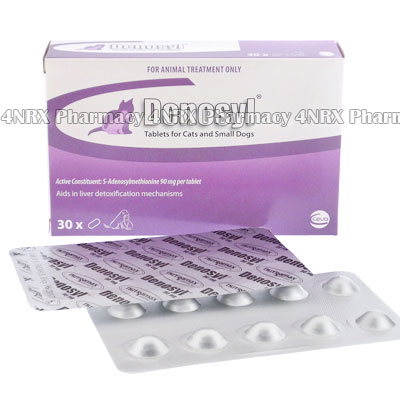 |
Home  4NRX Pet Pharmacy 4NRX Pet Pharmacy  Denosyl (S-Adenosylmethionine) Denosyl (S-Adenosylmethionine) |
|
|||||||||
|
|
Denosyl (S-Adenosylmethionine)
What is Denosyl (S-Adenosylmethionine) used for? Denosyl (S-Adenosylmethionine) is an oral supplement used to improve liver health in cats and small dogs weighing less than twelve pounds. It operates by elevating levels of glutathione in the liver to increase cell repair, regeneration, and to protect liver cells from cell death. This effect can also improve the mental health of aging dogs. Your veterinarian may prescribe it to treat other unlisted conditions, as well. How should I use Denosyl (S-Adenosylmethionine)? Strictly follow the instructions of your veterinarian while using Denosyl (S-Adenosylmethionine) to get the most effective results from treatment. One tablet is normally administered daily, but the best dosage will be determined by your pet's health condition and the severity of its symptoms. The tablets should be given whole and may be hidden in a snack or food if your pet has trouble taking it. Always ask your veterinarian any questions you have about the medication to ensure the correct administration. What are the side effects of Denosyl (S-Adenosylmethionine)? The use of Denosyl (S-Adenosylmethionine) may cause mild side effects in some animals such as diarrhea, vomiting, or nervousness. Immediately inform your veterinarian if you observe any symptoms that worry you to make sure the correct alterations are made to your pet's regimen to prevent further complications. Be especially cautious about any signs of an allergic reaction such as skin rashes, unusual swelling, or trouble breathing. Please Note Strictly follow all instructions provided to you by your veterinarian while using Denosyl (S-Adenosylmethionine). Optimum and safe dosage can differ based on the animal and the condition being treated. As this medication may be unsafe for certain pets, it is essential you always inform your veterinarian if your pet is pregnant or breastfeeding, as well as if it has any allergies, other illnesses, or ongoing health conditions, and if it is taking any other form of medication, supplements, or herbal products. Immediately seek emergency medical care if your pet has an allergic or hypersensitive reaction. Common signs of a reaction include hives, swelling, skin rashes, chest pains, as well as trouble breathing or swallowing. 
|
||||||||||||||||||||||